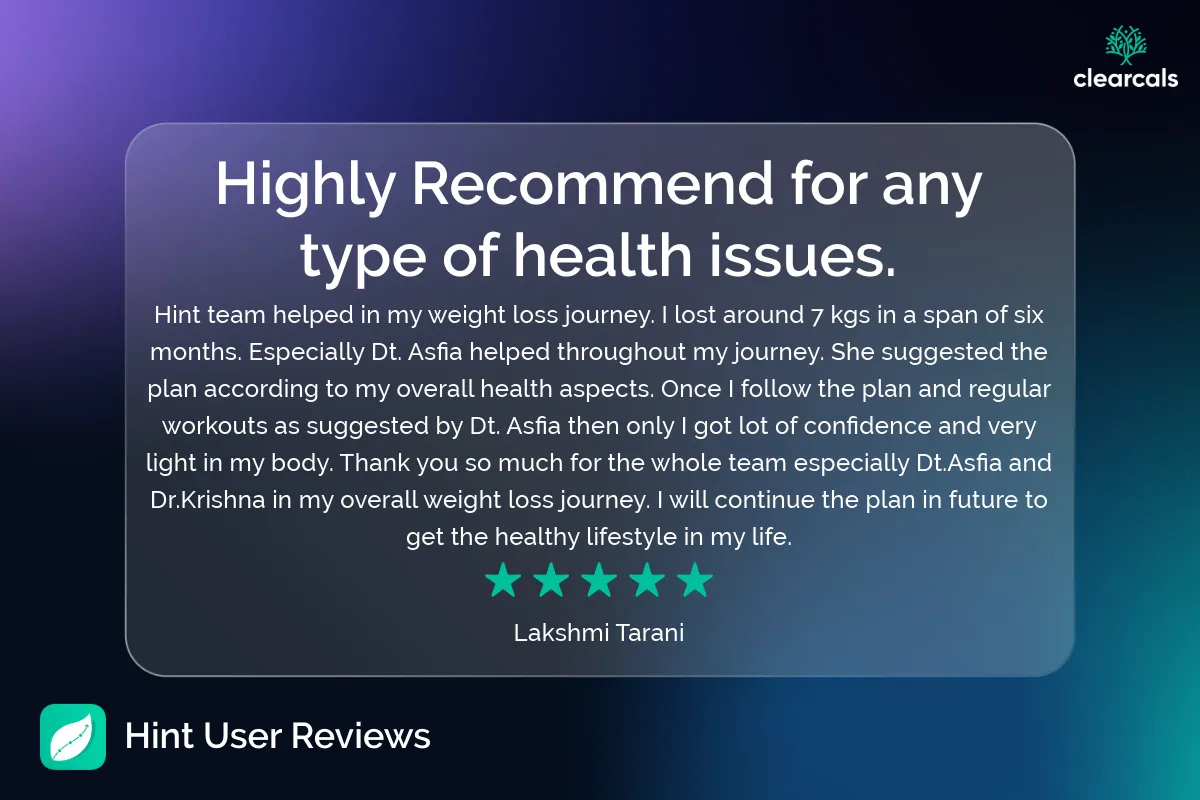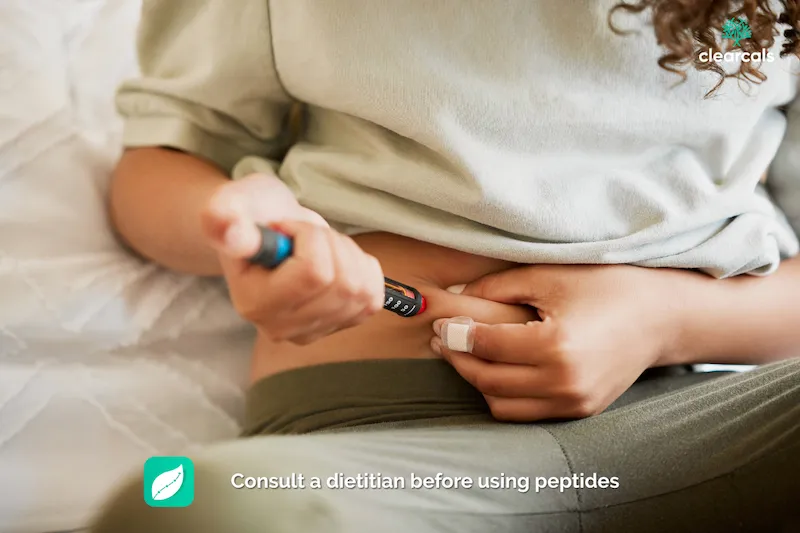Looking for a Personalized Diet Plan?
PCOD Diet Chart: Indian Diet Plan for PCOS and PCOD

TL;DR
- Managing PCOS and PCOD is simpler with the Hint app.
- Within minutes, you can receive a personalized Indian diet plan for PCOS and PCOD.
- This plan helps regulate menstrual cycles, reduces insulin resistance, and supports weight loss.
- Review the do’s, don’ts, and general tips for managing PCOS and PCOD effectively.
- If you have any further questions not answered in the FAQs, don’t hesitate to contact us at support@clearcals.com!
How to Subscribe to Hint Pro or Hint Premium
Download and Install the Hint App:
Search for "Hint" on the Apple App Store or Google Play Store, download, and install it.
Create an Account or Log In:
Open the app, create an account, and provide your profile details, including age, gender, height, weight, and physical activity level.
Choose a Subscription Plan:
Select "Subscribe to Hint Pro" and pick a plan (monthly, quarterly, or yearly). Review the features and benefits, including your personalized PCOD diet chart for managing PCOS and PCOD.
Alternatively, opt for Hint Premium, which includes unlimited consultations with expert dietitians along with your personalized PCOD diet chart.
Enter Payment Information and Confirm:
Complete the subscription process, and enjoy instant access to your personalized PCOD diet chart and other exclusive features.

Overview
Finding the right PCOD diet chart or PCOS diet plan can be challenging, especially for Indian women.
PCOS (Polycystic Ovary Syndrome) and PCOD (Polycystic Ovarian Disease) are common hormonal disorders that can cause irregular periods, weight gain, acne, and insulin resistance.
A well-structured diet can help manage these symptoms and prevent complications.
A personalized PCOS/PCOD diet plan is tailored to your specific needs, considering factors like dietary preferences, age, height, weight, and physical activity level.
The Hint app makes it easy to access this tailored plan, helping you regulate hormones, manage weight, and improve overall health.
PCOD vs. PCOS: What’s the Difference?
Though PCOD and PCOS are often used interchangeably, they refer to two distinct conditions with some similarities:
PCOD (Polycystic Ovarian Disease):
In PCOD, the ovaries produce many immature or partially mature eggs, which can lead to cysts. It’s less severe than PCOS, and lifestyle changes, including a balanced diet, can significantly help manage symptoms. Weight gain, acne, and irregular periods are common but can be controlled with proper care.
PCOS (Polycystic Ovary Syndrome):
PCOS is more severe than PCOD and is considered a metabolic disorder. It not only affects the ovaries but also the entire endocrine system. Women with PCOS often experience higher levels of androgens (male hormones), leading to issues like hirsutism (excess hair growth), infertility, and more significant insulin resistance.
Both conditions affect hormonal balance and can lead to complications if left unmanaged, such as diabetes and heart disease. However, diet plays a crucial role in managing both PCOS and PCOD.
How This Diet Plan Helps Manage PCOS and PCOD
A personalized PCOD diet chart can effectively manage both conditions by focusing on:
Balancing Hormones:
By incorporating foods rich in essential vitamins like B6, D, magnesium, and zinc, the plan helps restore hormonal balance, regulating menstrual cycles and improving overall reproductive health.
Reducing Insulin Resistance:
The diet includes low-glycemic index foods that help control blood sugar and improve insulin sensitivity, which is vital for both PCOS and PCOD management.
Supporting Weight Loss:
Many women with PCOS or PCOD struggle with weight gain due to hormonal imbalances. The plan is high in fiber, healthy fats, and proteins, helping you manage your weight effectively and reduce obesity-related complications.
Preventing Long-Term Complications:
Regular use of this diet plan, along with exercise, can reduce the need for hormonal medications and lower the risk of developing more severe health conditions such as diabetes and cardiovascular disease.
With the Hint app, you can get access to this PCOS/PCOD diet plan instantly, designed by specialists and backed by extensive research.
Plan Duration
The PCOS/PCOD diet plan is available as a monthly subscription, with renewal options for one month, three months, or one year.
Diet Types
The PCOD diet chart is available in three variations to accommodate your dietary preferences:
Vegetarian Diet Plan for PCOS/PCOD
This diet includes plant-based foods and dairy products but excludes eggs, meat, fish, and other animal products.
Ovo-Vegetarian Diet Plan for PCOS/PCOD
Includes vegetarian foods and egg recipes but excludes meat, fish, and seafood.
Non-Vegetarian Diet Plan for PCOS/PCOD
This plan includes non-vegetarian foods such as meat, fish, seafood, eggs, and dairy products.

Do’s and Don’ts for Managing PCOS and PCOD
Do’s:
- Follow the seed cycling process to balance estrogen and progesterone levels.
- Start your day with seed powder for its magnesium content to help balance hormones.
- Track your nutrient intake (like vitamin D, magnesium, B vitamins, and calcium) using the Hint app.
- Stay hydrated with lemon water or buttermilk.
- Eat raw vegetable salads before meals to prevent overeating.
- Track your meals and workouts using the Hint app to monitor calorie intake and calorie burn.
Don’ts:
- Avoid skipping meals and indulging in deep-fried, processed, or high-fat foods.
- Limit caffeine consumption to prevent hormonal imbalances.
- Avoid foods with preservatives and high glycemic index (like potatoes, yams, and sweet potatoes).
- Refrain from crash diets, as they may worsen symptoms in the long term.
General Tips for PCOS and PCOD Management
- Monitor your TSH levels every 3-6 months to prevent thyroid complications, which are common in PCOS and PCOD patients.
- Log your meals daily using the Hint app to track nutrient intake and monitor vitamin D and magnesium consumption.
- Aim for gradual weight loss, with a target of 0.5 to 1 kg per week, to help improve menstrual regularity.
- Ensure proper sleep (7-8 hours) to avoid increased calorie intake and hormonal imbalances.
- Engage in physical activity like walking, yoga, or cycling to manage weight and stress levels.
- Keep track of your periods to monitor improvements.
Frequently Asked Questions About PCOS and PCOD
Should PCOS/PCOD patients avoid dairy and gluten?
No, there is no scientific evidence to avoid these foods entirely. You can consume them in moderation.
How can I lose weight with PCOS/PCOD?
Following this PCOD diet chart will support gradual and healthy weight loss. A 5% to 10% reduction in body weight can help improve menstrual cycle regularity.
What nutrients help relieve PCOS/PCOD symptoms?
Nutrients like vitamin D, B vitamins, magnesium, iodine, and selenium can improve insulin resistance and hormonal balance.
What are the complications of PCOS/PCOD?
Both conditions can lead to complications like type 2 diabetes, high blood pressure, heart disease, and infertility.
For more FAQs and detailed answers, check out the PCOS/PCOD section in the Hint app.
Final Thoughts
Managing PCOS and PCOD effectively requires a comprehensive approach.
The Hint app simplifies this process by offering a personalized PCOD diet chart tailored to your unique needs.
Following this plan helps regulate menstrual cycles, reduce insulin resistance, manage weight, and reduce dependence on medications.
By subscribing to Hint Pro or Hint Premium, you unlock features like unlimited consultations with expert dietitians, advanced nutrient tracking, and personalized meal planning.
Start your journey toward better health today with the Hint app and your personalized PCOD diet chart.






